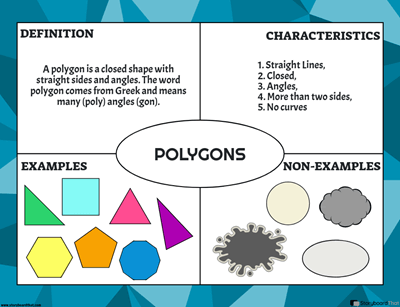Activity Overview
Both triangles and quadrilaterals are big groups. One of the standards for elementary grades is to be able to recognize shapes and categorize them. There are many things to remember about each polygon, and it can be tricky to keep them all straight.
In this activity, students will create lost flyers to help find and identify some common or regular polygons that have gone "missing". Students may also enjoy making Wanted Posters for any law-breaking polygons, or "fashion" reviews of celebrity polygons. To add faces to shapes, type "face" or "faces" into the search field.
Categorize Triangles
| Triangles | can be named by both sides and angles, making seven different types of triangles. |
|---|---|
| Equilateral Triangles | have equal side lengths and equal angle measurements. |
| Scalene Triangles | have different lengths for each side. |
| Isosceles Triangles | have at least two sides with equal length. (An equilateral triangle is ALSO an isosceles triangle) |
| Acute Triangles | have three acute angles. |
| Right Triangles | have one right angle and two acute angles. |
| Obtuse Triangles | have one obtuse angle and two acute angles |
Special Quadrilaterals
| Square | quadrilateral with four equal sides and four right angles |
|---|---|
| Rectangle | quadrilateral with four right angles |
| Rhombus | quadrilateral with four equal sides |
| Parallelogram | quadrilateral with two sets of parallel sides |
| Trapezoid | quadrilateral with one pair of parallel sides |
| Kite | quadrilateral with two pairs of adjacent congruent sides |
Lists like the ones above contain helpful information, but can be too wordy and unclear. Charts with images and labels are sometimes more kid-friendly (or just more friendly in general). Sometimes making chart after chart can become tiresome and muddle the brain, so a little extra ingenuity can go a long way.
Template and Class Instructions
(These instructions are completely customizable. After clicking "Copy Activity", update the instructions on the Edit Tab of the assignment.)
Student Instructions
Create a "Lost" or "Wanted" poster for different polygons. Be sure to include the properties that make them a part of the category they belong to!
- Click "Start Assignment".
- Find the shape you will be making your poster for and drag it down into the cells.
- Use textables or the description box to identify the name of the shape, how many sides it has, how many angles it has, and any other special information that will help people find the shape.
- Add faces or other fun items to jazz up your shapes!
Lesson Plan Reference
Activity Overview
Both triangles and quadrilaterals are big groups. One of the standards for elementary grades is to be able to recognize shapes and categorize them. There are many things to remember about each polygon, and it can be tricky to keep them all straight.
In this activity, students will create lost flyers to help find and identify some common or regular polygons that have gone "missing". Students may also enjoy making Wanted Posters for any law-breaking polygons, or "fashion" reviews of celebrity polygons. To add faces to shapes, type "face" or "faces" into the search field.
Categorize Triangles
| Triangles | can be named by both sides and angles, making seven different types of triangles. |
|---|---|
| Equilateral Triangles | have equal side lengths and equal angle measurements. |
| Scalene Triangles | have different lengths for each side. |
| Isosceles Triangles | have at least two sides with equal length. (An equilateral triangle is ALSO an isosceles triangle) |
| Acute Triangles | have three acute angles. |
| Right Triangles | have one right angle and two acute angles. |
| Obtuse Triangles | have one obtuse angle and two acute angles |
Special Quadrilaterals
| Square | quadrilateral with four equal sides and four right angles |
|---|---|
| Rectangle | quadrilateral with four right angles |
| Rhombus | quadrilateral with four equal sides |
| Parallelogram | quadrilateral with two sets of parallel sides |
| Trapezoid | quadrilateral with one pair of parallel sides |
| Kite | quadrilateral with two pairs of adjacent congruent sides |
Lists like the ones above contain helpful information, but can be too wordy and unclear. Charts with images and labels are sometimes more kid-friendly (or just more friendly in general). Sometimes making chart after chart can become tiresome and muddle the brain, so a little extra ingenuity can go a long way.
Template and Class Instructions
(These instructions are completely customizable. After clicking "Copy Activity", update the instructions on the Edit Tab of the assignment.)
Student Instructions
Create a "Lost" or "Wanted" poster for different polygons. Be sure to include the properties that make them a part of the category they belong to!
- Click "Start Assignment".
- Find the shape you will be making your poster for and drag it down into the cells.
- Use textables or the description box to identify the name of the shape, how many sides it has, how many angles it has, and any other special information that will help people find the shape.
- Add faces or other fun items to jazz up your shapes!
Lesson Plan Reference
More Storyboard That Activities
Introduction to Geometry
Pricing for Schools & Districts
© 2025 - Clever Prototypes, LLC - All rights reserved.
StoryboardThat is a trademark of Clever Prototypes, LLC, and Registered in U.S. Patent and Trademark Office







